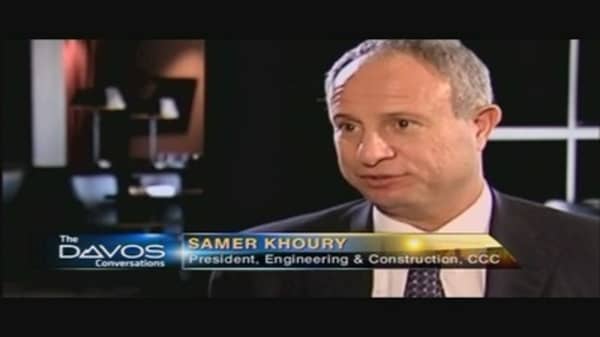One of the world's largest contractors is actively diversifying away from its home turf in the Middle East in light of rising political risks, opting instead to win exposure to territories such as Africa, former Soviet Republics and Australia.
Consolidated Contractors Company (CCC) has helped build some of the planet's biggest projects, including the world's largest shopping mall in Dubai and the largest man-made port in Qatar.
"If the strain in the Arab World continues, I would like to reduce our presence in the Arab World to maybe less than 50 percent, today it is 70 percent," Samer Khoury, President of CCC, told CNBC's "Access: Middle East" in an exclusive interview. "That's why we went to countries like Africa, CIS (Commonwealth of Independent States), and recently we went to Australia".
The strategic shift is not driven by diminishing opportunities in the region. In fact, according to Ventures ME, the value of new construction projects in the GCC (Gulf Cooperation Council) is forecast to rise this year by a third, with $64.5 billion of work to be awarded over the next 12 months.
Supported by global dependence on energy and regional infrastructure needs, the "forecasted vast construction spend will create increasing demands on both project owners and contractors as they deliver these projects over the next five years," Rizwan Shah,Managing Director at Deloitte Corporate Finance Limited, noted in a report last month.
With revenues close to $6 billion last year, the family-owned conglomerate is benefiting from the spending binge in the Gulf as governments seek to keep their citizens content. To a certain extent, the trend has offset losses and delays encountered in markets such as Egypt and Libya.
But just throwing money at the problem does not guarantee long-term stability. Khoury pointed out that political leaders in countries like Saudi Arabia would have to focus more on education, addressing youth unemployment and diversifying away from the oil sector.
"Look at what happened to Bahrain…so I think the whole Gulf is not immune and they realize that," he added. Since protests first hit the streets in February of 2011, the island-nation of Bahrain is still grappling with incidents of violence and a divided political spectrum that is forcing many investors to tread cautiously.
The GCC, comprised of six oil-producing nations on the Arabian Peninsula, has long been pursuing improved economic integration.Yet, the attitude towards outbuilding each other makes little sense to Khoury, who reiterated that finding a unique differentiator was the only way to securing sustainable growth.
"Let's be honest. The problem in my opinion in the Gulf is that they try to make, to copy similar economies. I would have thought it would be better well planned under the GCC. Now everybody wants to have their own airline. Everybody wants to have the biggest port".
Perhaps ironically building big does not necessarily turn into enviable margins for contracts. CCC failed to turn a profit with its massive mall in Dubai,which opened its doors in 2008 after some four years of construction.
The company currently operates in over 50 countries, and is targeting Kazakhstan,Turkmenistan and Azerbaijan with their oil and gas reserves to stimulate future growth. BP data ranks Turkmenistan's natural gas reserves fourth in the world,only trailing Russia, Iran and Qatar. Still, the region comes with its own challenges.
In the case of Kazakhstan, irregular application of regulations,and bribery, was a problem."That's why it's shying away investors moving into the country. It's worth the risk, but you have to allow for it".
This week on Access: Middle East: An exclusive interview with the President of Consolidated Contractors Company(CCC), Samer Khoury. Tune in to find out what his outlook is for the North African economies post-Arab Spring, and why he's keeping the company's headquarters in Athens despite the euro zone debt troubles.



